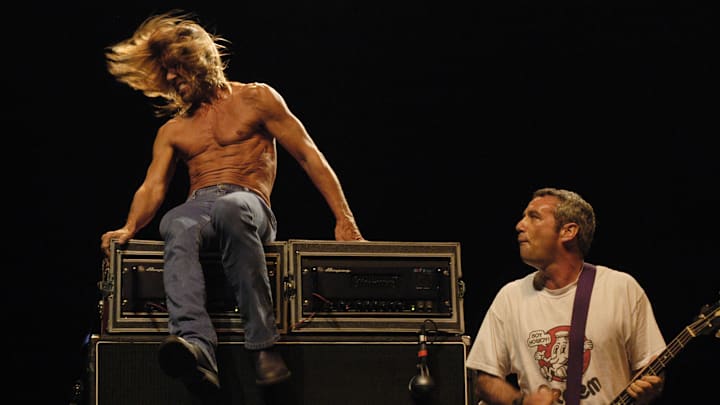The Stooges is the self-titled debut studio album by the American rock band The Stooges, released on August 5, 1969. The Stooges were known for their raw and aggressive style, which helped lay the foundation for punk rock and alternative music in the years to come. The band's lineup for this album included "Godfather of Punk" Iggy Pop (born James Osterberg, vocals), Ron Asheton (guitar), Dave Alexander (bass), and Scott Asheton (drums), and producer John Cale providing some tasty additional instruments on a few tracks.
Raw sound of "The Stooges"
This album is often cited as one of the earliest and most influential punk rock records, though it's debated which album or song in music history is truly the first punk song. The Stooges is characterized by its largely stripped-down, minimalist approach and the band's penchant for creating a chaotic, high-energy sound (though, to be thorough, the tracks "We Will Fall" and "Annie" are decidedly slower, even though they still contain some energy). Of course, Iggy Pop's charismatic and confrontational stage presence, along with his distinctive, rebellious vocals, set him apart as a frontman, and that energy is pretty well captured on the album. His performances were known for their unpredictability and wildness, and this sound was also quite new back in 1969.
The innovation factor is something contemporary listeners might easily forget, as they may discuss disappointments and surprises with the album's content. Really, though, there were very few bands out there who were easily comparable to this. The album features iconic tracks like "I Wanna Be Your Dog," "1969," "No Fun," and ""Real Cool Time," which have become classic punk and garage rock anthems. The lyrics often centered on topics like rebellion, alienation, and youthful frustration, which is exactly why they tie into punk rock so well.
Influence, initial reception, and legacy
The Stooges album influence can be heard in the music of later punk and post-punk bands like The Ramones, The Sex Pistols, and The Clash. Though bands like The Kinks had a similar energy with songs like “You Really Got Me,” The Stooges took it to another level with their premiere. Sure, the album did not achieve the biggest commercial success upon its release but garnered a cult following over the years. It was praised for its raw energy and Iggy Pop's captivating performance.
In retrospect, The Stooges is considered a hugely important album in rock music, even if not quite as popular as The Beatles' A Hard Day's Night" It laid the groundwork for punk rock and alternative music and inspired countless musicians and bands that followed. Would The Ramones have written "Blitzkrieg Bop" without The Stooges being an influence? Fittingly, Joey Ramone's cover of the song "1969" appeared on his posthumously released solo album, Don't Worry About Me.
Final thoughts
The Stooges went on to release several more albums, and Iggy Pop's solo career also gained significant recognition. The Stooges has stood the test of time and is now celebrated as a classic in the rock and punk genres, and beyond. That brings me to a final point: Though I have said plenty about genres here, it almost feels like there's something wrong with that focus. Though it's easy enough to locate some Chuck Berry and Bo Diddley-style influences on the album, other tracks like "We Will Fall" are more psychedelic and experimental-sounding, without being so hung up on genre constraints.
It seems that, all these years later, some people forget this isn't just a "proto-punk" album, but also the group trying their hands at raw, psychedelic rock and largely succeeding (though, of course, some critics have always lambasted the album, and surely always will). The album also has the feel of "garage rock" in some ways, or of a band that performed in local bars yet tried to transcend bars, garages, subgenres, and the limitations of time and space. Like other bands, they started small, with their first gig occurring in 1967 at a Halloween party at their own house.
And here is a song featuring one of the first riffs I learned to play on guitar (if you'll allow me to get personal):
More music news and analysis
